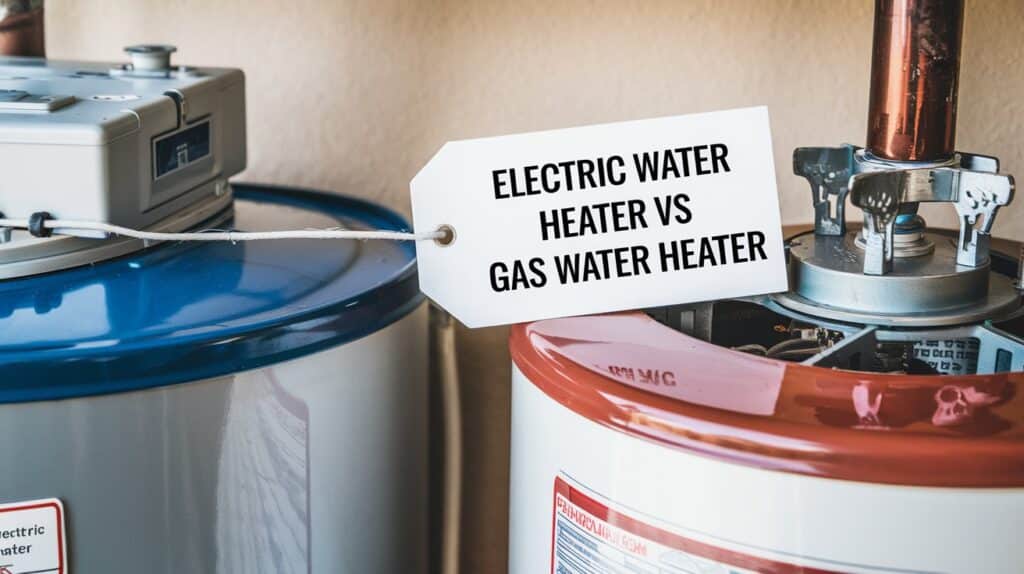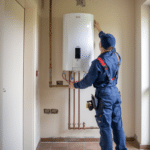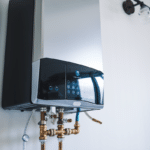
Table of Contents
- Key Takeaways
- How Gas and Electric Water Heaters Work
- Cost of Purchase and Installation
- Energy Efficiency and Operating Costs
- Heating Speed and Recovery Time
- Lifespan and Maintenance Needs
- Environmental Considerations
- Suitability for San Diego Homes
- When to Replace Your Water Heater
In San Diego homes, hot water is more than a comfort—it’s a daily necessity. But what happens when your water heater needs an upgrade, or your energy bills start creeping up? One of the most common decisions homeowners face is choosing between a gas or electric water heater.
Both systems heat your water. But how they do it—and how much they cost you over time—can differ in meaningful ways. This guide covers everything you need to know to make the smartest, most cost-effective choice for your San Diego home.
Need help choosing the right system? Contact Voyager Plumbing San Diego for expert advice and fast installation.
Key Takeaways
- Electric water heaters are cheaper to install, longer lasting, and better for solar-powered homes.
- Gas heaters offer faster heating and lower utility costs—especially in large households.
- Monthly savings from gas can add up over time, but installation may cost more.
- Electric models are more energy-efficient and better for the environment, particularly with solar use.
- The right system depends on your home setup, energy source, and daily water use.
How Gas and Electric Water Heaters Work
Both systems aim to deliver reliable hot water, but they operate differently.
- Gas water heaters use a burner to heat water with natural gas. Heated exhaust escapes through a vent pipe.
- Electric water heaters use internal electric heating elements to warm water inside the tank.
The heating source is the biggest difference. Gas models often reheat water faster. Electric models tend to be easier to install and are considered more efficient in energy transfer.
San Diego homes can support either type, but understanding the pros and cons of each helps you decide which one makes sense long term.
Cost of Purchase and Installation
Upfront cost is a big consideration. Electric water heaters are generally cheaper to purchase and install, especially in homes that don’t have an existing gas line.
Gas heaters often involve:
- Higher equipment costs
- Venting and combustion safety components
- Specialized labor for gas line connections
Average installation costs in San Diego:
- Electric heater: $1,000–$1,500
- Gas heater: $1,300–$2,000+
If your home already has a gas hookup, the price gap narrows. But if new gas lines are needed, electric may be more budget-friendly up front.
Voyager Plumbing also offers exclusive plumbing specials that can reduce your installation cost—ask us about current deals when scheduling your water heater upgrade.
Energy Efficiency and Operating Costs
Electric heaters are often labeled as more energy-efficient because they convert almost all electricity into heat. However, in San Diego, natural gas is significantly cheaper than electricity per unit of energy, so monthly operating costs are lower for gas.
Here’s what that means:
- Electric heaters: more efficient, higher utility costs
- Gas heaters: less efficient, lower monthly bills
Over a 10–12 year lifespan, those small monthly savings from a gas heater can add up—especially for larger households that use a lot of hot water daily.
Still, if you’re on a solar panel system, your electricity costs may be close to zero. In that case, an electric unit becomes much more cost-effective long term.
However, the exact cost comparison depends on a number of things, such as rate plans, energy providers, and changes in the market.
Heating Speed and Recovery Time
Gas heaters heat water faster. If your household has multiple bathrooms or tends to use hot water in multiple places at once, that speed matters.
 Electric water heaters typically take longer to reheat the tank once it’s been emptied. That can be a drawback if:
Electric water heaters typically take longer to reheat the tank once it’s been emptied. That can be a drawback if:
- You have a large family
- You run laundry and dishes back to back
- You use a single tank for a big home
For smaller homes or homes with predictable use, this slower recovery may not be an issue. But for larger households, faster recovery may justify a gas unit.
Lifespan and Maintenance Needs
Gas and electric units require similar upkeep, but gas systems have more moving parts and may need extra attention.
Typical maintenance for both:
- Annual tank flushing
- Anode rod replacement
- Pressure relief valve testing
Gas-specific maintenance:
- Inspecting gas lines and venting
- Monitoring combustion components
- Checking for carbon monoxide leaks
Average lifespan:
- Gas heater: 8–12 years
- Electric heater: 10–15 years
Electric heaters generally last longer and have fewer mechanical failures.
Environmental Considerations
If sustainability is a top concern, electric water heaters have the edge—especially in San Diego, where rooftop solar is common.
Electric heaters don’t burn fuel or produce on-site emissions. That makes them cleaner at the point of use. And if your home runs on solar power, you’re using clean energy to heat your water.
Gas heaters, while efficient in cost, produce carbon emissions from natural gas combustion. Over time, this can increase your household’s environmental footprint.
In short:
- Go gas for cost and performance
- Go electric for cleaner energy and longer life
Suitability for San Diego Homes
Here’s where things in the area matter.
Choose gas if:
- Your home already has a gas line
- You have a large family or high water usage
- You want faster heating and lower monthly bills
Choose electric if:
- You have solar panels or plan to install them
- You live in a smaller home or condo
- You want a cleaner, lower-maintenance system
Homes in coastal neighborhoods like La Jolla or Pacific Beach may already rely on electric systems. In older areas like North Park or South Park, you may already have gas infrastructure in place.
When to Replace Your Water Heater
Not sure if it’s time for a new unit? Watch for these signs:
- You run out of hot water faster than usual
- You hear banging or popping sounds
- Rust-colored or smelly water from taps
- Visible leaks or rust near the tank
- The unit is 10+ years old and showing wear
If you’re upgrading or replacing an old system, this is your chance to switch from gas to electric—or vice versa—based on your current usage, energy rates, and long-term savings goals.
Still unsure what’s right for your home?
Contact Voyager Plumbing today for expert advice on your next water heater. We serve San Diego neighborhood with honest recommendations, fast installation, and systems built to save you more in the long run.





